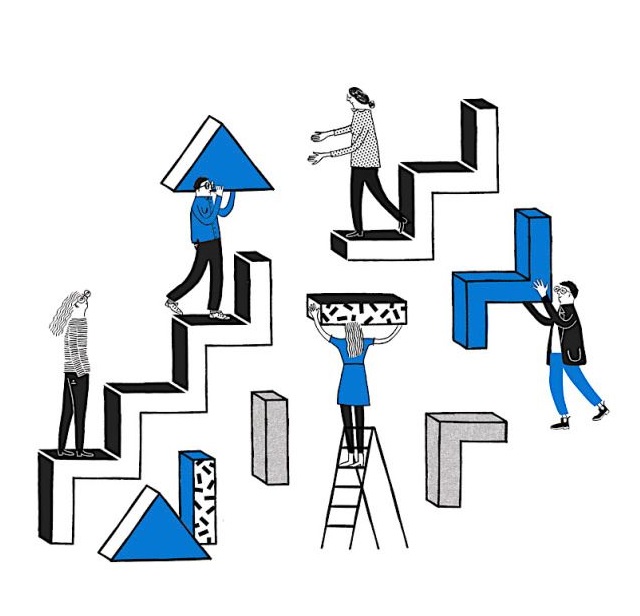· LeazeHub Team · Property Management · 8 min read
What are the 5 Ps of Property Management?
Learn the 5 Ps of Property Management—Plan, Process, People, Property, Profit—and how landlords and managers can use software to streamline workflows, reduce turnover, and boost NOI...

Whether you’re an independent landlord managing your first rental property or a boutique property manager juggling multiple owners’ investments, success in property management doesn’t happen by accident. It requires a strategic framework that addresses every aspect of your business. Enter the 5 Ps of Property Management: Plan, Process, People, Property, and Profit—a comprehensive approach that transforms chaotic operations into streamlined success stories.
In today’s competitive rental market, mastering these five pillars isn’t just recommended—it’s essential for survival and growth. According to the National Association of Residential Property Managers (NARPM), property managers who follow structured frameworks report 40% higher client satisfaction rates¹. And with the right property management software for small landlords, you can elevate each of these elements from good to exceptional. Let’s explore how you can implement these principles to build a thriving property management business.
What are the 5 P’s of Property Management?
- Plan
- Process
- People
- Property
- Profits
Plan: Strategic Vision for Long-Term Success
Every successful property management operation starts with a solid plan. Planning isn’t just about deciding which properties to acquire or manage; it’s about creating a comprehensive strategy that guides every decision you make.
Effective planning encompasses market analysis, investment strategy, and growth projections. For independent landlords and small property management companies, this means understanding local rental trends, setting realistic occupancy goals, and preparing for seasonal fluctuations. The Institute of Real Estate Management (IREM) reports that properties with documented strategic plans achieve 23% higher NOI than those without². Smart planning also involves creating contingency strategies for maintenance emergencies, vacancy periods, and market downturns.
Modern commercial and residential property management software transforms planning from guesswork into data-driven decision-making. With platforms like LeazeHub, you can access real-time market analytics, track performance metrics across your portfolio, and forecast future trends based on historical data. This technology enables you to make informed decisions about rent pricing, property acquisitions, and resource allocation—turning your planning process into a competitive advantage.
The best property management software for small landlords includes features like automated market comparison reports, vacancy prediction algorithms, and financial forecasting tools. These capabilities allow you to plan proactively rather than reactively, staying ahead of challenges before they impact your bottom line.
Process: Streamlining Operations for Maximum Efficiency
Efficient processes are the backbone of profitable property management. Without streamlined workflows, even the best plans fall apart in execution. Process optimization covers everything from tenant screening and lease management to maintenance scheduling and rent collection.
For boutique property managers handling properties with multiple owners, standardized processes ensure consistency across your entire portfolio. This means creating repeatable systems for tenant applications, establishing clear maintenance protocols, and implementing systematic inspection schedules. Research from Buildium’s State of the Property Management Industry Report shows that automated processes reduce operational costs by up to 35%³. When processes are well-defined and automated, you spend less time on administrative tasks and more time growing your business.
The best free property management software for small landlords offers process automation that eliminates manual tasks and reduces human error. Automated rent reminders, online maintenance requests, and digital lease signing streamline operations while improving tenant satisfaction. Property management software for small companies can handle everything from initial tenant inquiries to move-out inspections, ensuring nothing falls through the cracks.
Single family property management software particularly benefits from process automation, as it allows individual landlords to manage properties professionally without a large support team. Features like automated tenant screening, integrated background checks, and templated communication ensure consistent, professional interactions at every touchpoint.
People: Building Relationships That Drive Success
Property management is fundamentally a people business. Success depends on your ability to build and maintain strong relationships with tenants, property owners, vendors, and team members. The “People” pillar focuses on communication, trust-building, and creating positive experiences for everyone involved in your property ecosystem.
For tenants, this means responsive communication, fair treatment, and creating a sense of community. Happy tenants stay longer, take better care of properties, and provide referrals. According to AppFolio’s research, properties with high tenant satisfaction scores experience 50% less turnover⁴. For property owners, transparent reporting, regular updates, and demonstrable value justify your management fees and build long-term partnerships.
Property management software residential solutions enhance people management through integrated communication tools, tenant portals, and owner dashboards. These platforms facilitate instant messaging, document sharing, and real-time updates that keep everyone informed and engaged. When stakeholders can access information 24/7 through user-friendly portals, satisfaction levels soar.
Free rental property management software often includes basic communication features, but investing in comprehensive solutions provides advanced capabilities like automated satisfaction surveys, customizable owner reports, and integrated vendor management systems. These tools help you maintain strong relationships at scale, ensuring personalized attention even as your portfolio grows.
Property: Maintaining and Maximizing Asset Value
The physical property itself requires careful attention to maintain and increase its value over time. This pillar encompasses regular maintenance, strategic improvements, and proactive problem-solving that preserves asset condition and maximizes rental appeal.
Effective property management means staying ahead of maintenance issues before they become expensive problems. It involves regular inspections, preventive maintenance schedules, and quick response to repair requests. Multifamily Executive Magazine reports that preventive maintenance reduces total maintenance costs by up to 18% annually⁵. For properties with multiple owners, maintaining consistent standards across diverse portfolios requires systematic approaches and clear documentation.
Modern property management software transforms property maintenance from reactive to proactive. Features like automated inspection reminders, maintenance ticket tracking, and vendor coordination ensure properties remain in peak condition. Photo documentation, maintenance history tracking, and predictive maintenance algorithms help you anticipate issues before they impact tenants or property values.
The best free property management software includes mobile apps that allow property inspections on-site, instant photo uploads, and real-time maintenance updates. This technology ensures that whether you’re managing single-family homes or multi-unit buildings, every property receives the attention it deserves.
Profit: Maximizing Returns Through Financial Excellence
Ultimately, successful property management comes down to profitability. The Profit pillar focuses on maximizing revenue, minimizing expenses, and ensuring healthy returns for property owners while maintaining sustainable business operations.
Profit optimization involves multiple strategies: competitive but profitable pricing, efficient expense management, strategic property improvements that increase rental value, and minimizing vacancy periods. Industry data from RentSpree shows that properties using comprehensive management software achieve 12% higher net operating income⁶. For boutique property managers, this also means demonstrating clear value to property owners through detailed financial reporting and measurable performance improvements.
Property management software for small landlords provides powerful financial tools that transform bookkeeping from a chore into a strategic advantage. Automated rent collection reduces late payments, integrated accounting eliminates manual data entry, and comprehensive reporting provides real-time financial insights. Features like automated late fee assessment, expense tracking, and tax report generation ensure you capture every dollar while maintaining compliance.
The best property management software for small companies includes advanced financial features like portfolio performance analytics, ROI calculations for property improvements, and automated owner distributions. These capabilities allow you to make data-driven decisions that consistently improve profitability across your entire portfolio.
Bringing It All Together: Technology as Your Competitive Edge
The 5 Ps of Property Management provide a comprehensive framework for success, but implementing them effectively requires the right tools. Modern property management software integrates all five pillars into a unified platform that amplifies your capabilities while reducing your workload.
When you leverage technology like LeazeHub, you’re not just automating tasks—you’re transforming your entire approach to property management. From strategic planning powered by data analytics to profit optimization through automated financial management, the right software solution elevates every aspect of your operation.
The beauty of today’s property management software residential solutions is their scalability. Whether you’re an independent landlord with a single rental or a boutique manager with dozens of properties, these platforms grow with your business, ensuring you always have the tools you need to succeed.
Take Action Today
Mastering the 5 Ps of Property Management isn’t just about understanding these concepts—it’s about implementing them with the right technology partner. In today’s competitive market, property managers who embrace comprehensive software solutions outperform those relying on spreadsheets and manual processes.
Ready to transform your property management operation? Discover how LeazeHub can help you master all 5 Ps while saving time and increasing profitability. Visit https://leazehub.com today to explore our comprehensive property management platform designed specifically for independent landlords and boutique property managers.
Don’t let outdated methods hold your business back. Join thousands of successful property managers who’ve already discovered the power of integrated property management software. Your tenants, property owners, and bottom line will thank you.
References
National Association of Residential Property Managers (NARPM). (2024). Best Practices in Property Management Operations. Retrieved from https://www.narpm.org/
Institute of Real Estate Management (IREM). (2024). Income/Expense Analysis Reports. Retrieved from https://www.irem.org/
Buildium. (2024). State of the Property Management Industry Report. Retrieved from https://www.buildium.com/resource/2025-property-management-industry-report/
AppFolio. (2024). Property Management Insights and Research. Retrieved from https://www.appfolio.com/industry-insights
Multifamily Executive Magazine. (2024). Technology and Maintenance in Property Management. Retrieved from https://www.multifamilyexecutive.com/
RentSpree. (2024). Industry Reports and Property Management Trends. Retrieved from https://www.rentspree.com/
Property Management Insider. (2024). Technology Adoption Trends. Retrieved from https://propertymanagementinsider.com/
Journal of Property Investment & Finance. (2023). Digital Transformation in Property Management. Emerald Publishing. Retrieved from https://www.emerald.com/



